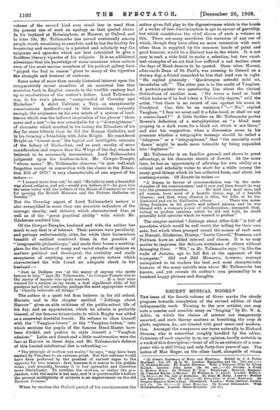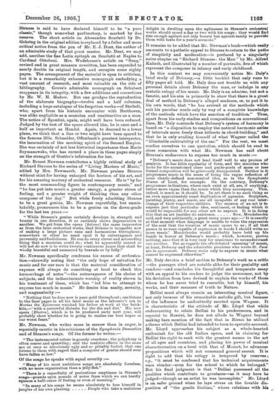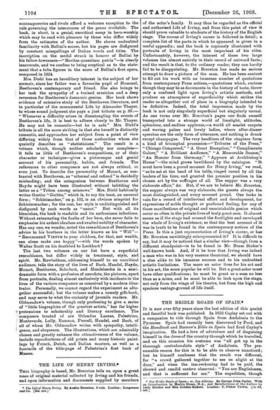RECENT MUSICAL BOOKS.*
THE issue of the fourth volume of Grove marks the steady progress towards completion of the revised edition of that indispensable work. Turning to the new articles, one may note a concise and sensible essay on " Singing " by Dr. W. A. Aikin, in which the claims of science are temperately asserted, and such thorny matters as breathing, the coup de glolte, registers, &c., are treated with good sense and modera- tion. Amongst the composers one turns naturally to Richard Strauss, who is somewhat roughly handled by the editor. Criticism of such asperity is, in our opinion, hardly suitable in a work of this description,—least of all in an estimate of a com- poser who is still living and only forty-four years of age. The notice of Max Hager, on the other han], alongside of whom • (1) Graves Dictiestars of ratite cad Mitsicians. Edited by 1. A. Puller Maitland, Vol. IV. (Q to 8). London : Macmillan and Co. [21s. net.]—,.. 12) Ittchard Strauss. By Ernest Newman. With a Personal Note by Alfred Kalisch. London : John Lane. [2a. dd. nec.-1 —(3) Betides: it Studs in Modern Music. By William H. Daly. Edinburgh : Ilethren Simpson. (4) Vincent° BeLLiai: a Memoir. By William A. C. Lloyd. London: Sisley's. 17s. 6(1.]—(6) The Life of Beethoven. By Alice M. Diehl. London t /ladder and Stoughteft. [10s. cc. tiet.j—(6) Siory•Livea of Great Musicians. By Francis Jaresoh Itoietoshatn. Illnstrated, London Wells Gardner, Dotted. and Co. 3s. 0.1.] —(7) Groat Mosicians. Hy Ernest Ohimeadow. With 32 Illusteationsi LOndcill : Grant Richards. [2.. &L]
Strauss is said to have declared himself to be "a pure . classic," though somewhat perfunctory, is marked by due reserve. The short article on Alessandro Scarlatti by Dr.
Gehring in the original edition is replaced by a fuller and more , critical notice from the pen of Mr. E. J. Dent, the author of . an admirable study of that great master. Mr. Dent, we may add, ascribes the fine Latin epitaph on Scarlatti at Naples to . Cardinal Ottoboni. Mrs. Wodebonse's article on revised and in great measure rewritten, has been expanded to nearly double its original length, and occupies some eighty pages, The arrangement of the material is open to criticism, • but it is a remarkably exhaustive monograph embodying a • vast amount of research, and most valuable on the side of • bibliography. Grove's admirable monograph on Schubert reappears in its integrity, with a few additions and corrections by Mr. W. H. Hadow. But one grudges the reproduction of the elaborate biography—twelve and a half columns, including a huge catalogue of his forgotten works—of Steibelt, who, apart from his historic encounter with Beethoven, was alike negligible as a musician and unattractive as a man. The notice of Spontini, again, might well have been reduced.
Judged by the test of the space allowed him, he is once and a .half as important as Handel. Again, to descend to a lower plane, we think that a line or two might have been spared to the famous Mlle. Schneider, Oftenbach's greatest interpreter, the incarnation of the mocking spirit of the Second Empire. She was certainly of not less historical importance than Marie • Szymanowska, who has earned a placein these pages simply on the strength of .Goethe's infatuation for her.
Mr. Ernest Newman contributes a highly critical study of • Richard Strauss to the series of "Living Masters of Music," edited by Mrs. Newmarch. Mr. Newman praises Strauss without stint for having enlarged the horizon of his art, and for his amazing mastery of orchestral resource. He is" by far the most commanding figure in contemporary music," and "he has put into music a greater energy, a greater stress of feeling, and a greater weight of thinking than any other 'composer of the day." But while freely admitting Strauss to be a great genius, Mr. Newman regretfully, but numis- Iakably, pronounces him to be a genius on the down-grade for the last ten years :—
" While Strauss's genius certainly develops in strength and beauty in one direction, it as certainly shows degeneration in
another. We get from the opera [Salome] the same impression as from the later orchestral works, that Strauss is incapable now of making a large picture sane and harmonious throughout;
somewhere or other he must spoil it by extravagance and .perversity and foolishness. He can do every clever and astounding thing that a musician could do; what he apparently cannot or will not do now is to write twenty continuous pages that shall be wholly beautiful and unmarred by bravado or by folly."
Mr. Newman specifically condemns his excess of orchestra- tion—shrewdly noting that "the only hope of salvation for
music and for our ears is that the material consideration of expense will always do something at least to check this limmorrhage of notes "—the extravagance of his choice of subjects, and the indiscriminate worship of reality shown in his treatment of them, which has "led him to attempt to express too much in musk." He denies him sanity, serenity, and magnanimity
" Nothing that he does now is pure gold throughout; one listens to the finer pages in all his later music as the labourer's son in Marius the Epicurean watched his father at work at the brick- kiln,—` with a sorrowful distaste for the din and dirt.' His new opera [Electra], which is to be produced early next year, will probably show whether he is going to realise our best hopes or our worst fears."
Mr. Newman, who writes more in sorrow than in anger, is especially caustic in his criticisms of the Symplumia Domestica and of Strauss's songs. Of the former be writes :— "The instrumental colour is grossly overdone ; the polyphony is often coarse and sprawling; and the realistic effects in the score
are at once so atrociously ugly and so pitiably foolish that one listens to them with regret that a composer of genius should ever have fallen so low."
Of the songs he speaks With equal severity :— '
"Many of his most ambitions songs are absolutely formless, with no more organisation than a jelly-fish."
• "There is a superfluity of pretentious emptiness in Strauss's songs—pounds upon pounds of notes from which we can hardly Squeeze a half-ounce of feeling or even of meaning."
"In many of his songs he seems absolutely to lose himself in jungles of his own planting People who take a malicious
delight in dwelling upon the uglinesses in Strauss's orchestral works should spend a day or two with his songs ; they would find sins enough against not only beauty but against sanity to provide them with texts for a year's sermons."
It remains to be added that Mr. Newman's book—which really amounts to a pathetic appeal to Strauss to return to the paths of simplicity and moderation—is prefaced by a singularly naive chapter on "Richard Strauss : the Man" by Mr. Alfred Kalisch, and illustrated by a number of portraits, five of whidh represent the composer in infancy and early childhood.
In this context we may conveniently float% Mr. Daly's brief study of Debussy,—a little booklet that only runs to
fifty pages all told. Mr. Daly does not trouble us with any .personal details about Debussy the man, or indulge in any ecstatic eulogy of his music. Mr. Daly is an admirer, but not a
fanatic, and his aim is primarily to show that there is a great
deal of method in Debussy's alleged madness, or, to put it in his own words, that "he has arrived at the methods which suit his peculiar needs only by way of a complete knowledge of the methods which have the sanction of tradition." That, apart from his early studies and compositions on conventional lines, Mr. Daly contends that Debussy's system of harmony Is based on "a disposition to employ the natural harmonic sail's of intervals more freely than hitherto in chord-building," and that he is only availing himself of what Wagner called the "illimitable cultivability of the ear." For the rest, we most
confine ourselves to one quotation, which should be read in close connexion with what Mr. Newman has said abott
Strauss's endeavours to express too much in music :—
"Debussy's music does not lend itself well to any process of analysis. It has little regularity of form, and the musician who looks for the accustomed clues and guide-posts of more or less formal composition will be grievously disappointed. Neither is it programme music in the sense of being the vague reflection of some clearly-defined non-musical idea, as in the Symphonic Poems of Liszt, for example. On the contrary, Debussy's programme indications, where such exist at all, are, if anything, rather more vague than the music which they accompany. This, indeed, is much as it should be. In art there is no such thing as an even approximately exact duplication of agencies. Sculpture, painting, poetry, and music, are all incapable of any real intet- change of their respective utilities. The mission of an art is to express just that particular idea, sentiment, or feeling whioh it would be impossible for any other art to express. It is in doing
this that an art justifies its existence Now, Mendelssohh
said, and very pertinently, a great many years ago It is exactly at that moment when language is unable to voice the expression of the soul that the vocation of music opens to us ; if all that passes in us were capable of expression in words I should write no more music.' Mendelssohn would probably have held up his hands in horror at Debussy's music ; which, however, proves nothing, save that it is very easy for musicians to misunderstand one another. But as regards the oft-debated 'meaning' of music, at least, Debussy and the admirable precisian who wrote St. Pau/ are in agreement. Debussy seeks only to express in music what cannot be expressed otherwise."
Mr. Daly devotee a brief section to Debussy's work as a critic —the passages cited are notable alike for their geniality and
candour—and concludes his thoughtful and temperate essay with an appeal to his readers to judge the newcomer, not by
his deviation from laws devised to explain the works of thotte whom he has never tried to resemble, but by himself, his works, and their measure of truth to Nature.
Bellini must always remain an interesting musical figure, not only because of his remarkable melodic gift, but because of the influence he undoubtedly exerted upon Wagner. It is characteristic of the attitude of Mr. Lloyd that while
endeavouring to relate Bellini to his predecessors, and in especial to Rossini, he does not allude to Wagner beyond making bare mention of the fact that in _Rienzi he utilised a theme which Bellini had intended to turn to operatic account.
Mr. Lloyd approaches his subject as a whole-hearted enthusiast for the old Italian opera, and in claiming for Bellini the right to rank with the greatest names in the art
of all ages and countries, and placing his power of musical characterisation on a level with that of Mozart, he advances propositions which will not command general assent. It is right to add that his eulogy is tempered by reserves ; e.g., "it Must be confessed that his technical acquirements
were sleader—even for the school to which he belonged." But his final judgment is that "Bellini possessed all the qualities which contribute to greatness—as it may here be judged—though as an artist he was incomplete." Mr. Lloyd
is on safer ground when he lays stress on the lovable din.. position of "the gentle Sicilian," whose relations with his
contemporaries and rivals afford a welcome exception to the rule governing the intercourse of the genus irritabile. The book, in short, is a genial, uncritical essay in hero-worship which may be read with pleasure by those who differ widely from the estimates of the author. He shows undoubted familiarity with Bellird's scores, but his pages are disfigured by constant misspellings of Italian words and titles. The inscription on the medal struck in honour of Bellini by his fellow-townsmen—"Meritas quaesitam patria "—is clearly inaccurate, and we confess to being sceptical as to the state- ment that a tuba figures in the score of Bellini's first opera, composed in 1824.
Mrs. Diehl has an hereditary interest in the subject of her memoir, since her father was a favourite pupil of Hummel, Beethoven's contemporary and friend. She also brings to her task the sympathy of a trained musician and a deep reverence for Beethoven's daemonic genius. Her book shows evidence of extensive study of the Beethoven literature, and in particular of the monumental Life by Alexander Thayer, to whose sound judgment she pays a just tribute on p. 88 :— " Whenever a difficulty arises in disentangling the events of Beethoven's life, it is best to adhere closely to Mr. Thayer. He may not be romantic—but he is safe." Mrs. Diehl's tribute is all the more striking in that she herself is distinctly romantic, and approaches her subject from a point of view differing widely from that of those authorities whom she quaintly describes as "statisticians." The result is a volume which, though neither scholarly nor complete— it tells us little of Beethoven's compositions, or of their character or technique—gives a picturesque and genial account of his personality, habits, and friends. The references to other composers are not always critical, or even just. To describe the personality of Mozart, as con- trasted with Beethoven, as "ethereal and refined" is decidedly misleading ; and the antagonism between Beethoven and Haydn might have been illustrated without belittling the latter as a "Triton among minnows." Mrs. Diehl habitually writes Goethe " Goethe," which is, to say the least, an unusual form ; " Schleimacher," on p. 102, is an obvious misprint for Schleiermacher; for the rest, her style is undistinguished and disfigured by such words as "anent." But with all its blemishes, the book is readable and its enthusiasm infectious. Without extenuating the faults of her hero, she never fails to emphasise his ardent idealism and exalted nobility of character. Has any one, we wonder, noted the resemblance of Beethoven's advice to his brothers in the letter known as his " War- " Recommend VIRTUE to your children, for that, not wealth, can alone make one happy "—with the words spoken by Walter Scott on his deathbed to Lockhart ?
The last two volumes on our list have a superficial resemblance, but differ widely in treatment, style, and spirit. Mr. Rowbotham, addressing himself to an uncritical audience, tells the story of the lives of Bach, Handel, Haydn, Mozart, Beethoven, Schubert, and Mendelssohn in a semi- dramatic form with a profusion of anecdote, the pictures, apart from portraits, dealing almost exclusively with incidents in the lives of the various composers as conceived by a modern illus- trator. Personally, we cannot regard the experiment as alto- gether successful; but the volume makes a comely gift-book, and may serve to whet the curiosity of juvenile readers. Mr. Oldmeadow's volume, though only professing to give a series of "little biographies of the greatest artists," has far higher pretensions to scholarship and literary excellence. The composers treated of are Orlandus Lassus, Palestrina, Monteverde, Lally, Rameau, Purcell, Handel, and Bach, of all of whom Mr. Oldmeadow writes with sympathy, intelli- ': gence, and eloquence. The illustrations, which are admirably chosen and greatly enhance the attractiveness of the volume, include reproductions of old prints and many historic paint- ings by French, Dutch, and Italian masters, as well as a facsimile of the title-page of Palestrina:s first book of Masses.








































 Previous page
Previous page